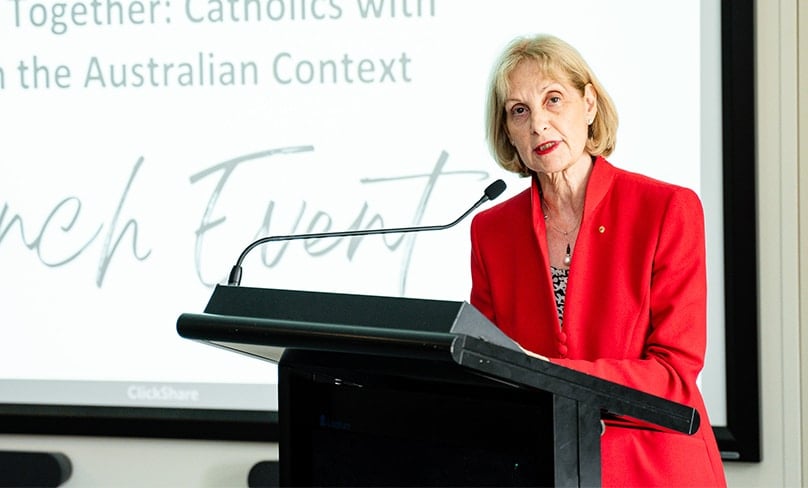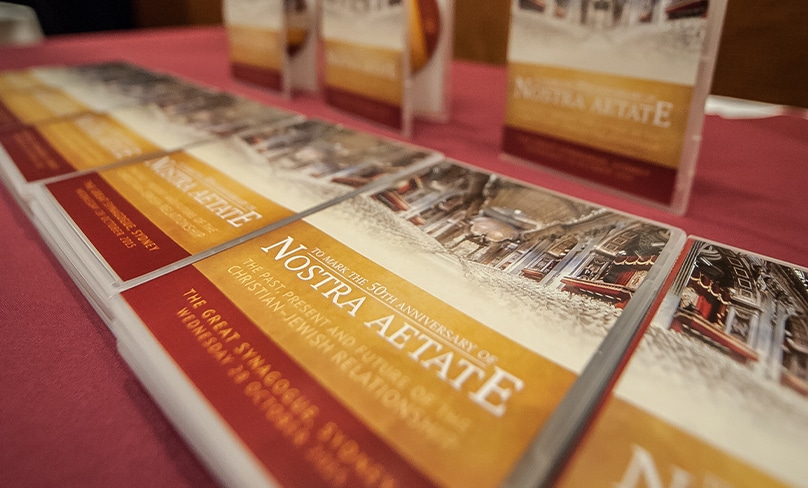
The Australian Catholic Bishops Conference has released a new statement on Catholic-Jewish relations, to address the resurgence in antisemitic attitudes and reinforce the significant steps forward between the faiths since the Second Vatican Council.
In the document, Walking Together: Catholics with Jews in the Australian Context, the ACBC says that a deep appreciation of Jesus Christ’s Jewish tradition is the starting point for mutual respect.
“We wish to encourage all people of goodwill, and especially Australia’s Catholics, to deepen their understanding of the Church’s relationship to Judaism by better appreciating the Jewishness of Jesus and of the first generation of Jesus’ disciples,” the document says.
Bishop Michael McKenna, chair of the bishops commission for Christian unity and inter-religious dialogue, launched the document at Mary MacKillop Place in North Sydney on 21 March, followed by a kosher lunch.
Bishop Michael McKenna, chair of the Bishops Commission for Christian Unity and Inter-Religious Dialogue, said Walking Together “aims to help Catholics understand more deeply the uniqueness of our relationship with Judaism, our elder sisters and brothers in faith.”
Jillian Segal, president of the Executive Council of Australian Jewry, said Walking Together “bears eloquent testimony to the intimacy of the connection between Judaism and Christianity”.
She said it affirms “the essential Jewishness of Jesus and the fact that he prayed and worshipped as a Jew; the ongoing, irrevocable nature of the covenant between G-d and the Jewish people; and the fact that Jesus and the Pharisees were in alignment, not in opposition, to one another.”
Walking Together succeeds a document published by the commission in 1992, in order to reflect new developments within the church and world, including Pope Francis’ 2013 apostolic exhortation Evangelii Gaudium, the 2017 Uluru Statement from the Heart and advances in biblical scholarship.
Walking Together offers guidelines about how Catholics can enhance their relationships with their Jewish sisters and brothers, which it says is necessary for them to work together for the flourishing of society and bring about God’s reign.

It also calls Catholics to reject racism and antisemitism.
“Although today’s Jews in Australia live in relative peace and safety compared to other parts of the world, they have not escaped the impact of antisemitic attitudes and actions,” the document said.
“Antisemitism within Australia has been exacerbated by political tensions in other parts of the world.
“We are further concerned about increasing levels of ignorance and even denial of the Holocaust. Large numbers of Jewish Holocaust survivors immigrated to Australia after World War II, some of whom are still with us.
“That they and their descendants still find themselves exposed to denials and minimisation of the terrible crimes committed by the Nazi Regime is a violation of their human dignity.”
In reflecting on enhancing Jewish-Catholic relations Walking Together also reaffirms important principals from Vatican II’s declaration Nostra Aetate: the unique and permanent bond the church has with the Jews; the irrevocable nature of the convent between God and the people Israel; and the church’s condemnation of antisemitism.
The document also reaffirms that “the Catholic Church neither conducts nor supports any specific institutional mission work directed towards Jews.”
“Later portraits of the Pharisees by the Gospel evangelists are not historically accurate,” the document says.
Rather Jesus’ concern to renew the faith of his people, especially their belovedness by God revealed in their Torah, was also the concern of the Pharisees.
Quoting a Pontifical Biblical Commission 2001 document, it says “the negative presentation of them in the Gospels was influenced in part by subsequent polemics between Christians and Jews.”
